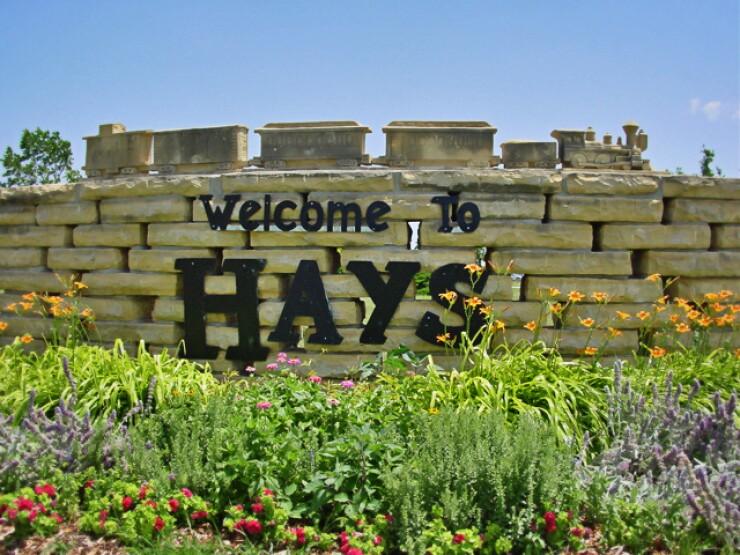Three members of the community vision team that guided last year's failed 30-year, $78 million proposal offered a post-mortem for the Hays USD 489, Kan., school board Monday night.
While Valerie Wente, Chris Dinkel and Tom Wasinger were not in total agreement on their evaluation of why the bond failed in November, they offered some main takeaways for the board:
- Listen to the voters.
- Have a plan or multiple plans to offer the public.
- Offer multiple bonds over shorter periods of time.
The 20-member vision team formed the proposal presented to voters, working with the district's architectural firm, the DLR Group, and construction manager at-risk Nabholz Construction.

The vision team was split on its view of the 2016 $94 million bond proposal by an 80 percent to 20 percent vote, the trio told the board, and acknowledged that was a problem, but they were in disagreement if the process was a good one two to one.
"I don't think the process was good at all," Wasinger, one of the two members who voted against the 2016 bond, said.
Because the vision team was made up of volunteers, Wasinger said there was no one at fault for that imbalance.
"The way it was set up, I'm not sure it could have achieved anything else," he said.
Board members Paul Adams and Luke Oborny asked how a more equal balance could be achieved for such a group in the future.
"You're not and that's why I don't think the vision team works," Wasinger said. "People like me are not simply going to come and sit through this."
Wasinger's harshest criticism, however, was the board did not listen to the voters.
Polls during the vision team's process showed the public would support smaller, more frequent bonds that added about $10 per month to an average household's property taxes, and that voters wanted to focus on elementary schools.
"If you had just listened to this poll, you would have passed a bond," Wasinger said.
"The people told you what they're willing to spend and how they would like to see it focused. You ignored every one of those things," he said.
The political climate also is one difficult to work in, Wente and Dinkel said, and that could pose problems in passing smaller, more frequent bonds.
"I still feel that the plan we have was still a good plan," Wente said of the $78 million proposal. She said the group felt pushed to add to the dollar amount of the original plan, but did not say by who.
She also said the vision team discussed smaller, more frequent bonds but was hesitant to go that route.
"Breaking that down into smaller bonds and asking for smaller amounts over three to five bonds in the future is a scary thing."
She said although voters in Johnson or Shawnee counties might pass those kinds of proposals, she doesn't know if that would work here.
"The animal in Hays is different," she said.
"The political climate in Hays is always going to be tough," said Dinkel, who was elected to Hays City Commission in November's election.
Dinkel also noted other factors that contributed to the bond's failure, such as an unstable economy, a general distrust of education in the state and the fact Hays had not considered an education bond in 40 years.
That fact greatly affected the plan the vision team came up with, he said.
"It's all being dictated by what's breaking now. That's why the list got pretty long," he said.
"The goal was hopefully whatever we did would outlast the payments. That ended up with a pretty big sticker," he said.
"Apparently that didn't resonate with the population. Clearly. It lost," he said.
The 30-year term of the bond is the one aspect of the proposal Dinkel said he would change.
"I was very nervous when we started talking about it, but we moved in that direction to try to replace Wilson (Elementary School) rather than just renovate," he said.
"I think that was probably one of the biggest decision we tried to stretch too far," he said.
The number of elementary schools must be addressed early in the process for any future bond, Wente said.
"In my opinion we have too many elementary schools," she said, and the buildings are in poor condition.
All the elementary schools were built more than 50 years ago, with Lincoln the oldest at 93 years.
Adams said that because of their age, those schools are not a matter of deferred maintenance but in need of renovation if they are to continue to be used.
The vision team and board members were in agreement the board will have to take a larger role in a future bond proposal. In several regular meetings and one special meeting, the board has begun discussions about long-range facilities planning to guide the next bond proposal.
Board member Greg Schwarz would like the board to do all the planning, while others prefer another committee with a balance of board oversight.
Wasinger urged the board to use more than one approach. That might mean a committee similar to the vision team, combined with the board and perhaps another committee headed by former board member Josh Waddell, who Wasinger said has emailed a proposal for that to the board.
"You need to decide those 30-year questions. There isn't any reason why you should just have one path. There should be more paths," he said.





